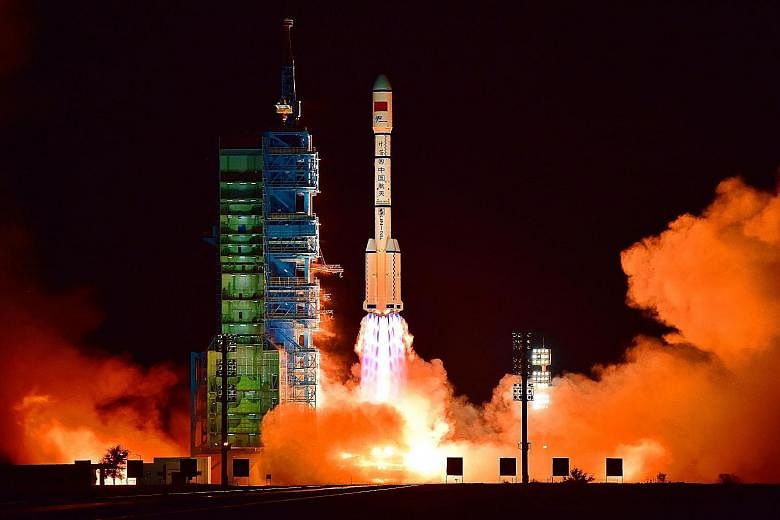BEIJING • Tiangong 1, China's first space laboratory, will come to a fiery end late next year.
The average decommissioned satellite either burns up over a specific ocean region, or is ejected to a far-off orbital graveyard. But Tiangong 1's demise is shaping up to be something different.
Chinese officials appeared to admit that they had lost control of the station during a Sept 14 news conference in Jiuquan.
"Based on our calculation and analysis, most parts of the space lab will burn up during the fall," said Mr Wu Ping, a director at China's space engineering office, during the conference.
He added that China is monitoring the space station for collisions with other objects.
And Xinhua, China's government-run news agency, reported that the Chinese space agency may need to release an international forecast for where Tiangong will land at a later date - an uncertainty that seems to indicate the descent is uncontrolled.
For the moment, Tiangong 1 remains whole, orbiting the planet more than 320km above Earth's surface.
China launched Tiangong 1, which translates to "Heavenly Palace", in 2011. It served as China's base for space experiments for roughly 41/2 years, two years longer than originally anticipated.
The last crewed mission was in 2013, though the station continued to autonomously operate until it was decommissioned in March.
Soon after that, rumours surfaced that China no longer had control of the spacecraft.
In June, amateur satellite tracker Thomas Dorman, from El Paso, Texas, warned Space.com that based on his observations, the 8-tonne space lab was out of control.
Harvard University astrophysicist Jonathan McDowell agreed that China's announcement indicated the spacecraft will fall where it may. "You really can't steer these things," he told The Guardian. "Even a couple of days before it re-enters, we probably won't know better than six or seven hours, plus or minus, when it's going to come down. "
Most satellites are not laid to rest this way. Many smaller craft incinerate completely in the upper atmosphere.
For larger spacecraft destined for re-entry, the usual method is a planned descent.
The wreckage that survives re-entry splashes down far from human habitation.
Even though China may not be able to steer Tiangong 1's flaming corpse into a specific spot, humans will likely be unharmed.
The odds are very low that it will fall in an inhabited area: Roughly speaking, half of the world's population live on just 10 per cent of the land, which translates to only 2.9 per cent of Earth's surface.
WASHINGTON POST

